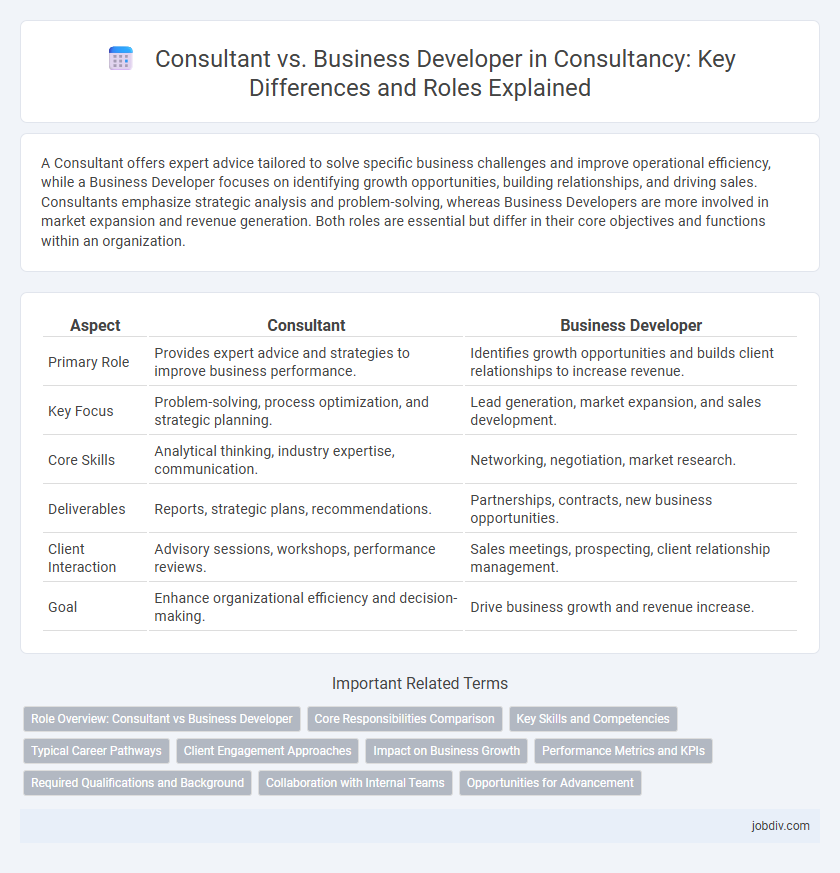A Consultant offers expert advice tailored to solve specific business challenges and improve operational efficiency, while a Business Developer focuses on identifying growth opportunities, building relationships, and driving sales. Consultants emphasize strategic analysis and problem-solving, whereas Business Developers are more involved in market expansion and revenue generation. Both roles are essential but differ in their core objectives and functions within an organization.
Table of Comparison
| Aspect | Consultant | Business Developer |
|---|---|---|
| Primary Role | Provides expert advice and strategies to improve business performance. | Identifies growth opportunities and builds client relationships to increase revenue. |
| Key Focus | Problem-solving, process optimization, and strategic planning. | Lead generation, market expansion, and sales development. |
| Core Skills | Analytical thinking, industry expertise, communication. | Networking, negotiation, market research. |
| Deliverables | Reports, strategic plans, recommendations. | Partnerships, contracts, new business opportunities. |
| Client Interaction | Advisory sessions, workshops, performance reviews. | Sales meetings, prospecting, client relationship management. |
| Goal | Enhance organizational efficiency and decision-making. | Drive business growth and revenue increase. |
Role Overview: Consultant vs Business Developer
Consultants analyze client challenges and design tailored strategies to improve operational efficiency and achieve business goals. Business Developers focus on identifying market opportunities, building client relationships, and driving revenue growth through strategic partnerships and sales initiatives. While consultants offer expertise-driven problem solving, business developers concentrate on market expansion and commercial value creation.
Core Responsibilities Comparison
Consultants primarily analyze client problems, design tailored strategies, and implement solutions to improve operational efficiency and drive organizational change. Business developers focus on identifying market opportunities, building client relationships, and negotiating deals to increase revenue and expand business reach. Both roles require strong communication skills, but consultants emphasize problem-solving and analytical expertise, while business developers prioritize sales and networking capabilities.
Key Skills and Competencies
Consultants excel in analytical thinking, problem-solving, and industry-specific expertise to provide strategic advice and optimize business processes. Business Developers focus on relationship-building, sales acumen, and market research to identify growth opportunities and drive revenue expansion. Both roles require strong communication skills, but Consultants prioritize technical knowledge while Business Developers emphasize client acquisition and negotiation abilities.
Typical Career Pathways
Consultants typically follow a career pathway starting as analysts or associates before advancing to senior consultant, manager, and eventually partner or director roles, specializing in problem-solving and strategic advice. Business developers often begin in junior sales or marketing positions, progressing to roles such as business development manager, senior manager, and director focused on client acquisition and revenue growth. Both pathways demand strong communication skills, but consultants emphasize analytical expertise whereas business developers prioritize relationship-building and market expansion.
Client Engagement Approaches
Consultants prioritize in-depth client analysis and tailored problem-solving strategies to address specific business challenges, leveraging industry expertise to deliver actionable insights. Business Developers focus on building long-term relationships and identifying growth opportunities through proactive networking and market expansion tactics. Both roles emphasize client engagement but differ in approach, with consultants concentrating on customized solutions and business developers driving strategic partnerships and revenue growth.
Impact on Business Growth
Consultants analyze organizational challenges and design strategic solutions that enhance operational efficiency and market positioning, directly influencing sustainable business growth. Business developers identify and cultivate new market opportunities, driving revenue expansion through relationship building and strategic partnerships. The synergy between consultants' problem-solving expertise and business developers' market acumen maximizes overall growth potential.
Performance Metrics and KPIs
Consultants prioritize delivering actionable insights through client satisfaction scores, project completion rates, and return on investment (ROI) metrics to measure performance. Business developers focus on lead conversion rates, revenue growth, and market penetration as key performance indicators (KPIs) to assess business expansion success. Both roles rely on tailored KPIs to drive strategic decision-making and optimize overall organizational performance.
Required Qualifications and Background
Consultants typically require advanced degrees such as an MBA or specialized certifications in management, analytics, or industry-specific fields, combined with strong problem-solving and communication skills. Business Developers often have backgrounds in sales, marketing, or business administration, emphasizing experience in market research, client relationship management, and negotiation. Both roles demand strategic thinking but differ in focus: consultants analyze and improve internal business processes while business developers drive growth through external partnerships and new market opportunities.
Collaboration with Internal Teams
Consultants leverage deep industry expertise to identify strategic opportunities while collaborating closely with internal teams to align solutions with business objectives. Business developers focus on expanding market reach and generating revenue by coordinating efforts between sales, marketing, and product departments. Effective collaboration between consultants and business developers ensures seamless integration of strategy and execution, driving sustainable growth.
Opportunities for Advancement
Consultants often advance by deepening industry expertise and moving into senior advisory or partner roles, leveraging strategic problem-solving skills to drive client success. Business Developers expand through building extensive networks and mastering market entry strategies, leading to leadership positions in sales, marketing, or corporate growth departments. Both paths emphasize continuous skill enhancement, but Consultants focus on analytical depth while Business Developers prioritize relationship management and revenue growth.
Consultant vs Business Developer Infographic

 jobdiv.com
jobdiv.com